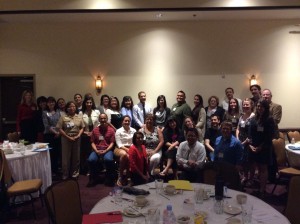Forty-five legal aid, healthcare and government leaders representing dozens of Native American tribes met in Tuba City, Arizona, on May 29, 2014, to better understand the issues affecting tribal health and discuss the role legal care can play in addressing barriers to healthcare. The meeting, “Partnering for Native Health,” was convened by DNA-People’s Legal Services and the National Center for Medical-Legal Partnership, with funding from The Kresge Foundation.
Many of the most pressing health needs of Native Americans are related to social factors outside the traditional role of what medical care can treat – things like domestic violence, limited housing options, and the challenges that come with a complex network of tribal, state, and federal benefit programs. In his welcoming remarks, Navajo Nation Vice President Rex Lee Jim shared that the Navajo way has always emphasized prevention and health, and that the recent focus on upstream prevention efforts to ensure wellness are really grounded in Navajo practices that people have gotten away from in recent decades. Keynote speaker Dr. Gayle Dine’Chacon, Associate Professor at the University of New Mexico School of Medicine, discussed broad public health needs in Indian country, with a focus on the real meaning of self-determination in the era of the Affordable Care Act.
Program for the Health of the People was one of the first medical-legal partnerships to focus on serving Native Americans. It is a partnership of DNA-People’s Legal Services, the Navajo Area Indian Health Service (Shiprock Service Unit), and the Tuba City Regional Health Care Corporation. Since 2009, Program for the Health of the People has helped hundreds of patients increase household income and resources, access new health insurance coverage, obtain or maintain affordable housing, and stay safe from abuse. The medical-legal partnership has become an essential part of how these hospitals and health centers deliver care.
During the meeting, one of the program’s founders, Matt Van Wormer, shared many of the lessons learned and how together the legal and health team have been able to address many community and family problems more effectively. Dr. Jeff Powell and Dr. John Mohs from the Northern Navajo Medical Center offered reflections on how to successfully integrate legal aid services within an Indian Health Services (IHS) facility and how new programs can engage health care partners.
One of the goals of the meeting was to help spread the medical-legal partnership approach to other healthcare institutions in tribal country. Participants heard from attorneys, physicians and allied health providers at medical-legal partnerships serving other populations about the role of interprofessional education and care coordination in ensuring partnerships effectively address identified health problems. Maha Jweied from the U.S. Department of Justice’s Access to Justice Initiative shared strategies for navigating federal agencies and building public support for integration of lawyers into the healthcare setting.

